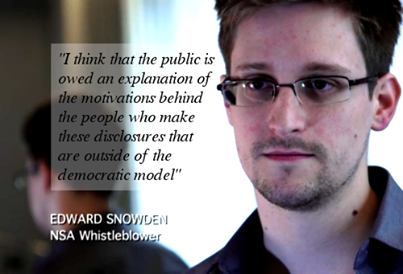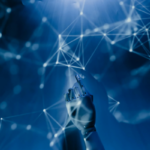July 7, 2014 – Over breakfast this morning I got into a debate with a friend about threats to humanity in the near future. I argued that anthropomorphic influence on the environment and climate represented the greatest threat in the 21st century. He, on the other hand, picked up his smartphone and said “these are the greatest threat.” He didn’t mean the phones themselves, but the technology they represented – connectivity that made all vulnerable to snoops.
That brought to mind Edward Snowden and Wikileaks and the recent series of disclosures that have given us a new picture of government’s overreach into our private lives. Snowden’s leaks of which the latest reported in The Washington Post, show us that 90% of conversations, texts and emails sent over telecommunications networks are intercepted and have nothing to do with legitimate targeted surveillance. And to make matters worse, the captured data by organizations like the National Security Agency where Snowden worked as a contractor, is being retained. This captured data which you and I would consider personal and private, is now in the hands of an agency that appears to have few limits put on its authority.
So my friend had a point when he pointed to his smartphone. Every picture you take, every text you send, every phone call you make, is no longer private. And this is not limited to transmissions through mobile networks. Your WiFi home network is as vulnerable. Your land line phone calls which today are converted from analog to digital signals may also be intercepted as they travel from you to the person on the receiving end. Privacy is vanishing rapidly. So should we be worried? Absolutely and when we elect our governments we should be holding them to account on the issue of what is private and should remain so.
But getting back to our debate on greatest threats, I couldn’t help but think that we have seen cycles of this type of invasive and irrational “fear stoked” behaviour in the past by governments. We have had Soviet Communist invasive behaviour. We have seen fascist and Nazi invasive behaviour. We have had McCarthyism. We have profiled people by the colour of their skin and shape of their eyes and displaced them in times of war. We have discriminated and murdered people because of their cultural heritage and beliefs. So is this behaviour today much different than the past? Only in scale because we have the technology to reach further into private lives than ever before all because we are addicted to a telecommunications revolution that makes two-way communication ubiquitous. And with that comes the dark side.
On the other hand, our influence on the environment is more subtle than eavesdropping on conversations. When sea levels rise they go up in fractions of millimeters per year. You don’t notice the change that much because it is gradual and insidious. Climate scientists like to talk about the frog sitting in pot of water being heated on a stove. The frog doesn’t know to jump out until it boils to death. That’s the threat to humanity that I see as most compelling because we can ignore its insidious effects more easily.















[…] This article originally appeared on his blog here: https://www.21stcentech.com/greatest-threat-humanity-decades/ […]